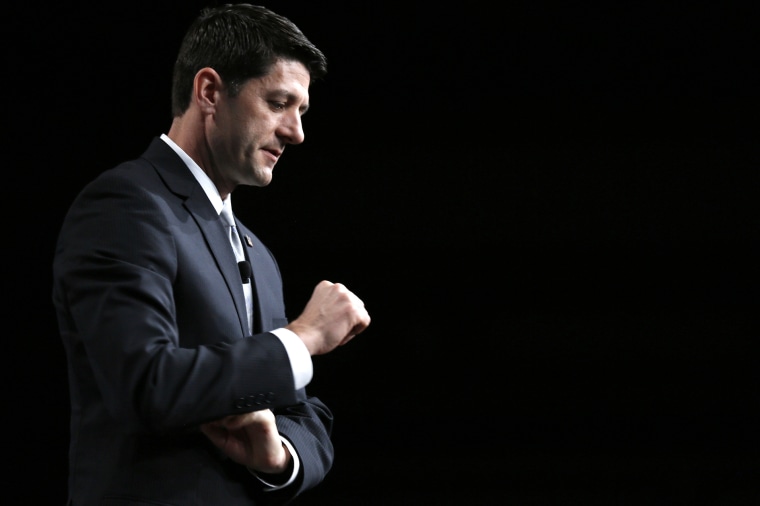Shortly before Americans were confronted with the latest mass shooting, congressional leaders were still offering their responses to last week's mass shooting. The
Washington Post reported this week on renewed interest in legislation on mental health.
House Republican leaders said this week that they are determined to pass reforms to federal mental health laws, potentially delivering a jolt to legislation that has been mired in partisan disputes for nearly three years. House Speaker Paul D. Ryan (R-Wis.) endorsed a long-simmering mental health overhaul at a Tuesday morning news conference immediately after offering his condolences to the victims of Friday's shootings at a Planned Parenthood clinic in Colorado.
The Republican leader said "one common denominator in these tragedies is mental illness," which is why he's throwing his support behind a reform bill authored by Rep. Tim Murphy (R-Pa.), which has not yet cleared committee.
According to the Post's piece, the legislation would "create a new assistant secretary of Health and Human Services to oversee substance abuse and mental health, overhauling the oft-maligned Substance Abuse and Mental Health Services Administration. It would also put a new emphasis on evidence-based treatments, and encourage court-ordered 'assisted outpatient treatment' programs for those who are mentally ill but who are not eligible for involuntary commitment."
But Congress being Congress, passing relatively straightforward reforms won't be easy. In the upper chamber, Senate Majority Whip John Cornyn (R-Texas) has a related bill -- provisions of which could be included in a comprehensive package --
which would "boost the federal background check system to prevent guns from getting into the hands of those with serious mental illness."
And while some parts of Cornyn's bill have drawn bipartisan praise, the trouble, as we
discussed in August, is that this same bill, which enjoys the NRA's backing,
would let "some people discharged from involuntary psychiatric treatment, who currently need court approval to buy firearms, immediately purchase guns."
The AP report over the summer quoted Arkadi Gerney, a gun policy expert for the liberal Center for American Progress, saying, "Senator Cornyn would make it easier, not harder for seriously mentally ill people to access guns."
It's safe to say the Republican approach to the issue has a few kinks that still need to be worked out.
In the meantime, let's also not forget that the Affordable Care Act can and should be
an important piece to the puzzle. University of Chicago professor Harold Pollack
explained in October that the ACA "remains the single most important measure to expand access to mental health and addiction treatment, serving severely vulnerable populations such as the homeless, addressing the complicated medical and psychiatric difficulties of many young men cycling through our jails and prisons."
In 2013, the National Alliance on Mental Illness (NAMI) released a report endorsing Medicaid expansion. The report argued that "States that decline to expand Medicaid will miss as good an opportunity as they may ever have to address this shameful void in access to mental health treatment." Addressing the connection between mental illness and violence, NAMI concluded: "In the aftermath of Newtown, many politicians and policy makers have promised to take steps to fix America's broken mental health system. Expanding Medicaid in all states would represent a significant step towards keeping those promises."
Pollack concluded, "If any other politician suggests that mental health rather than gun policy is central to reducing mass homicides, ask where they stand on Medicaid expansion. Their answer will be clarifying."
A question to keep in mind as the policy discussion moves forward.
